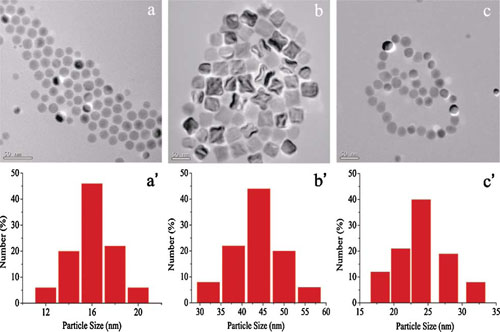Researchers at the State Key Laboratory of Solid Lubrication, Lanzhou Institute of Chemical Physics (LICP), Chinese Academy of Sciences (CAS), have demonstrated a facile method to synthesize monodisperse Fe3O4 NPs via the reductive decomposition of Fe(acac)3 in oleic acid.
In the synthesis, oleic acid acts both as a reducing agent and a stabilizer, and the particle size and shape are controlled by varying the amount of Fe(acac)3. Thermal conductivity measurements reveal that the thermal conductivity enhancement reaches up to 26.4% at amass fraction of 4% for 4 nm Fe3O4 NP-based nanofluids, and that the temperature variation has obvious effects on the thermal conductivity enhancement for the as-prepared nanofluids. Interestingly, nanofluids have lower viscosity than the corresponding base fluids.
 |
| TEM images and the size distribution histograms of as-prepared Fe3O4 NPs with the different average sizes of (a) and (a') ~16 nm, (b) and (b') ~ 44 nm, (c) and (c') ~ 24 nm. |
The promising features of good fluidity, long-term stability, decreased viscosity and high thermal conductivity enable the Fe3O4 NPs nanofluids to be used as advanced coolants in thermal energy engineering.
The work has received support from the National Natural Science Foundation of China (NSFC), the Major State Basic Research Development Program of China, the Specialized Research Fund for the Doctoral Program of Higher Education, the Fundamental Research Funds for the Central Universities and Open Project of Key Laboratory for Magnetism and Magnetic Materials of the Ministry of Education, Lanzhou University. The findings have been published in Dalton Trans.(Dalton Trans., 2012, 41, 896–899) .
